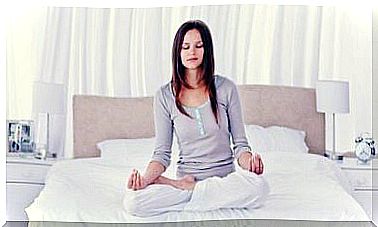The 5 Secrets Of Self-control, According To Tibetan Buddhism

While we all like to stay calm in difficult times and deal with issues with ease, we don’t always succeed. Sometimes this state of tranquility does not come our call. Other times, we haven’t developed the tools to stop the impulses, or maybe we don’t know the strategies to achieve it. Therefore, the secrets of self-control according to Tibetan Buddhism can be of great help in such circumstances.
Our instincts lead us to react impulsively when we feel threatened. In principle, if we wait about 10 minutes before reacting, we multiply by 10 the possibilities of offering a correct response to the situation. It would be the first of the secrets of self-control, but it is more Western than Tibetan.
Tibetan Buddhism has very sane ways of achieving this inner balance. It is a prior preparation and a lifestyle that makes it possible. Here are five of the secrets of self-control that Orientals have given us.
1. Meditate
We cannot live by chance and hope that this way of life will lead us to temperance. One of the goals of meditation is precisely to mold the mind to be more resilient and more effective against the onslaught of emotional storms.
For Tibetan Buddhists, one of the secrets of self-control is meditation. You don’t have to be a monk or anything like that. Set aside 5 minutes a day to focus on your breathing and your senses. It increases self-awareness and takes away the strength of those impulses that suddenly appear.

2. Eating, one of the secrets of self-control
Many will surely be surprised that eating is one of the secrets of self-control. When the brain does not have enough glucose stores, it is more likely to think less clearly. Likewise, maintaining control is a difficult exercise, which requires a lot of glucose stores.
It has been proven that people with low blood sugar are more likely to engage in compulsive behaviors. The answer is not to eat sugar, because it produces a mini glycemic shock which can be counterproductive. It is better to eat protein like meat or dried fruit and not go without eating for a long time.
3. Surf the waves
Human emotions are not static, but are constantly changing. If it were possible to graphically represent their dynamics, it would seem that they behave like the waves of the sea: they start to rise, reach a top and gradually decrease until they disappear.
It is important to be aware of this, because at times when a very strong emotion takes hold of us, the most appropriate thing is probably not to suppress it, but to let it complete its cycle. What is advisable is 10 minutes of stillness so that the anger, fear, or whatever, has time to reach its maximum and start to decrease.
4. Exercise, one of the secrets of self-control
Another secret to self-control is exercise. Physical activity is positive in every way because it helps maintain good health in body and mind. It also helps us to relieve stress and to experience a sense of well-being.
Exercise releases a neurotransmitter called GABA. This has the effect of generating a feeling of serenity. Therefore, if you are feeling very angry, or have an overwhelming emotion in your mind, go for a walk. 10 minutes of exercise per day is recommended.

5. Sleep
Many of the keys to good mental health are found in the act of sleeping. Fatigue alone generates feelings of irritation and intolerance that are hard to ignore. A person who has not slept well is much more likely to be carried away by uncontrollable negative emotions.
Likewise, not sleeping lowers the glucose level to its minimum expression. This is the reason why someone who has not slept or who slept badly looks, in particular, for sweet elements. Yet nothing can replace the effect of deep, restful sleep. You could say it is the basis of our mental health.
The secrets of self-control are unnecessary tricks if they are not put into practice. Losing control is not synonymous with openness or character, quite the contrary. Almost always the only thing we get with it is saying or doing stupid things that we later regret.










